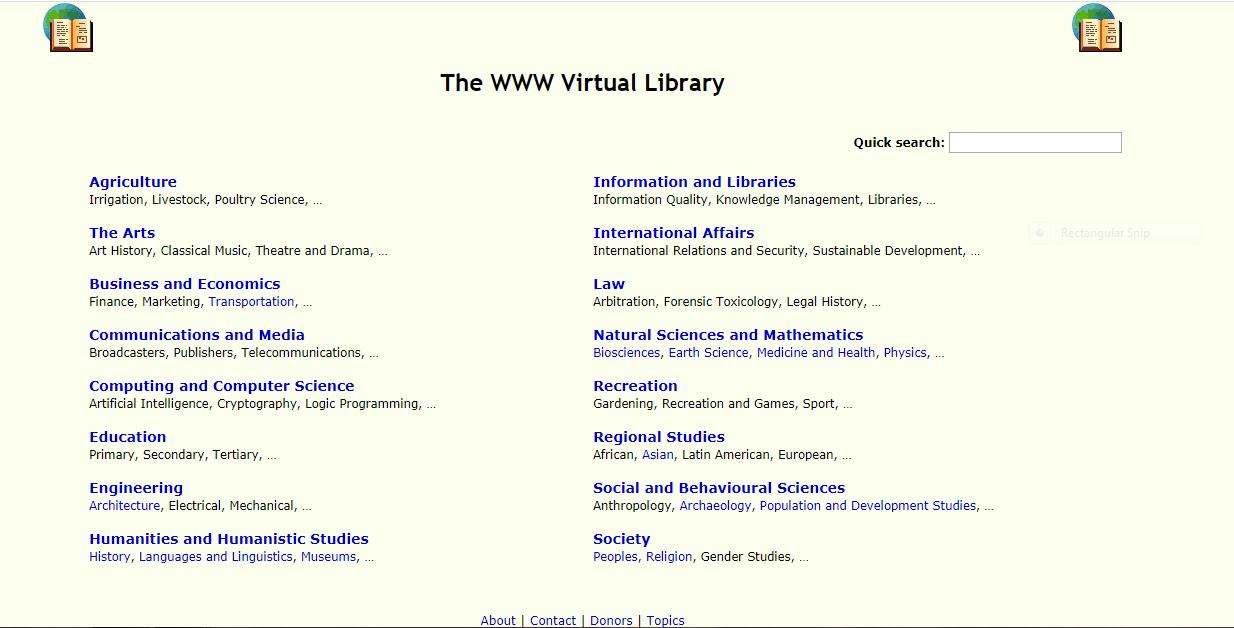Before Google’s prime: Search Engine History
Last Updated :
26 May, 2020
Search engines have become a valuable part of our lives. It is used by people of all ages to search for specific sites or tools that they require for a task. Search engines act as a gateway or a portal to all things on the internet. Even though it feels like their rise started in the early 2000s, the first one was actually made way back in the 90s.
In 1990, the first search engine was launched on September 10, 1990, named Archie. Despite, having semblance, in name, to the comic character Archie, the name was just a short form to “archives”. It only listed the sites and not the contents due to lack of space.
The picture below is a snapshot of the version that is still running, along with its link:

The next year, World Wide Web Virtual Library (VLib) was created. CERN played an important role by hosting web servers. The site is still running: http://www.vlib.org/

Following the Archie trend, Veronica and Jughead named search engines came to light. Veronica was launched in November 1992 to search for Gopher files. Jughead is pretty much the same as Veronica but it was more localized. It was developed by Rhett Jones in 1993. Around this time, the World Wide Web Wanderer, a web crawler, was created to find the size of the world wide web. Later that year, ALIWEB was created in October of 1993. This exhibited similarities to Archie by indexing the web in the same way. Despite having the advantage of no bots collecting data, people found it hard to figure out how to submit their site. In December of the same year, three search engines that gave rise to the term ‘Primitive Web Search’, were created, namely: JumpStation, World Wide Web Worm, and RBSE spider.
Architext was created in 1993 but was later launched in 1995 with the name Excite and went public later on. It was one of the most popular names back in the 1990s. It was made by a team of Stanford students. It even turned down the offer to buy Google at an amount much less than a million dollars. It was acquired by many other companies afterward but it is still active.
The year 1994 saw a rise to many web directories such as EINet Galaxy and Yahoo!. EINet Galaxy wasn’t very popular because the web at that time wasn’t that vast and didn’t need a directory. Yahoo! started as a directory that contained various other URLs that David Filo and Jerry Yang liked and saved. They added descriptions to each URL which made it far more unique than any other directory at the time. However, as time went by, the number of sites increased. They added informational sites for free but also opened up to commercial ones at a cost.
The next search engine that made it big is called Lycos. The aspect that made it stand out is the number of documents that it cataloged, which went over 1.5 million by 1995.
In 1996, Larry Page and Sergey Brin launched Backrub, the predecessor to Google that we know and love today. I used backlinks to get the results for a search. It checked the relevance of a link and displayed according to the number of times it was mentioned in other sites. This also helped gauge how reliable a site was. In the same year, a unique search engine was launched, namely, AskJeeves (Now Ask.com). It used human editors to match the relevant links to the topic searched. However, spam swarmed the site soon after.
Google launched in 1998, boasting an index containing more than 25 million pages. This marks the beginning of its rise to its current stature. In 1999, many companies invested in it, and AOL made Google its primary search engine. In 2001, Excite suffered from bankruptcy and was bought by another company. The following years saw a lot of search engine takeovers.
In 2004, Microsoft jumped into the frenzy and created their own search engine called MSN. The year 2007 marks some of the major updates that Google had. This year, the company made various tabs for images, news, and much more. It turned to universal search which spanned across a lot more content. There was no stopping Google after this, so much that the upgrade of MSN to Bing, hardly affected its reputation.
Like Article
Suggest improvement
Share your thoughts in the comments
Please Login to comment...